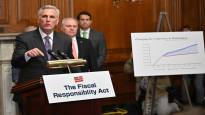WASHINGTON If Russia didn’t go to war in Ukraine, maybe there would have been vigilance in Finland last night as the United States played with the fate of the entire world economy.
However, in this world situation, it is understandable that the focus is not on the battle of the US Congress. This text may very well be the first you read about the US debt ceiling crisis.
If so, good news: the crisis is just about to be resolved. Overnight, the US House of Representatives approved a deal to lift the debt ceiling, and the Senate is expected to approve the deal as well.
The United States can therefore borrow more money and finance its already agreed expenses for at least the next two years. For example, the military aid promised to Ukraine.
The weeks-long tussle ended with a compromise by the Republican speaker of the House of Representatives by Kevin McCarthy and the president Joe Biden between. Biden yielded to certain conditions limiting government spending, and McCarthy gave up some of his demands.
You can read about the details of the agreement here, for example, but in reality they are not the most important thing for Finns.
Instead, it is essential to understand how close to a crisis the United States brought the entire world economy and what it says about the explosive sensitivity of the superpower.
First you have to twist one thing from the iron wire. The debt ceiling crisis is a rarity and a much more serious situation than the almost routine budget crisis that recurs regularly in the United States.
The state budget crisis is about a dispute about the state’s future expenditures, which at worst leads to a shutdown of the state administration. In practice, a shutdown occurs when Congress and the president cannot agree on the state budget. Then the state does not have an agreement on which activities will be financed and how much.
In this situation, part of the state employees will be laid off, and the state administration will be in a so-called shutdown mode until an agreement is reached. However, the state continues to pay many expenses as usual.
The debt ceiling crisis is about that, whether the United States is able to pay its already agreed expenses. The U.S. government economy is significantly in deficit, so the government pays its expenses with debt money. The debt ceiling crisis is about a situation where Congress does not agree to raise the debt ceiling. It is the limit up to which Congress has given the government the power to borrow money from the market.
In a situation where the debt ceiling is not raised before the government’s funds run out, the United States would drift into insolvency. Fortunately, this has never happened, because US insolvency would have unpredictable and radical consequences.
Without money, the United States would not be able to pay already agreed expenses, such as the social security payments of millions of Americans, the costs of food assistance programs, the costs of services purchased from companies, and even the salaries of government employees.
According to economists’ estimates, uncertainty about the future of the economy would collapse the stock market, which would lead to losses of Americans’ wealth and, for example, pension savings. That would shrink the economy even further. At the same time, obtaining a loan would become more difficult, and for example mortgage interest rates would skyrocket, causing the housing market to collapse. And so on.
In the darkest estimates of economic analysts, at least 8 million jobs would disappear in an instant and the US economy would possibly contract as strongly as during the financial crisis of 2008-2009.
That is, the same crisis that spread throughout the world’s economic system and hit Finland’s cyclically sensitive economy particularly hard.
US money runs out next Monday, so close.
In this spring’s debt ceiling crisis shows what the polarization of US politics means for the world.
The growing radical wing within the Republicans sometimes arbitrarily opposes even the party’s own policy, and does not accept compromises. Many of them want to punish Kevin McCarthy for the debt ceiling deal by stripping him of his powers as Speaker.
Within the Democrats, there are also plenty of dissatisfied representatives of the progressive wing. In their opinion, even agreeing to negotiations was a wrong move by Biden, and budget cuts related to social security in the United States should not be accepted under any circumstances.
These fringe groups of both parties are united above all by the fact that they clearly emphasize domestic politics. Although for very different reasons, both groups want the US to turn inward. In the debt ceiling discussions, the responsibility of the United States for protecting the world economy was mostly a side note.
The debt ceiling must be voted on again in two years.
Before that, a new, even more polarized House of Representatives is elected, for which the rest of the world matters even less.
